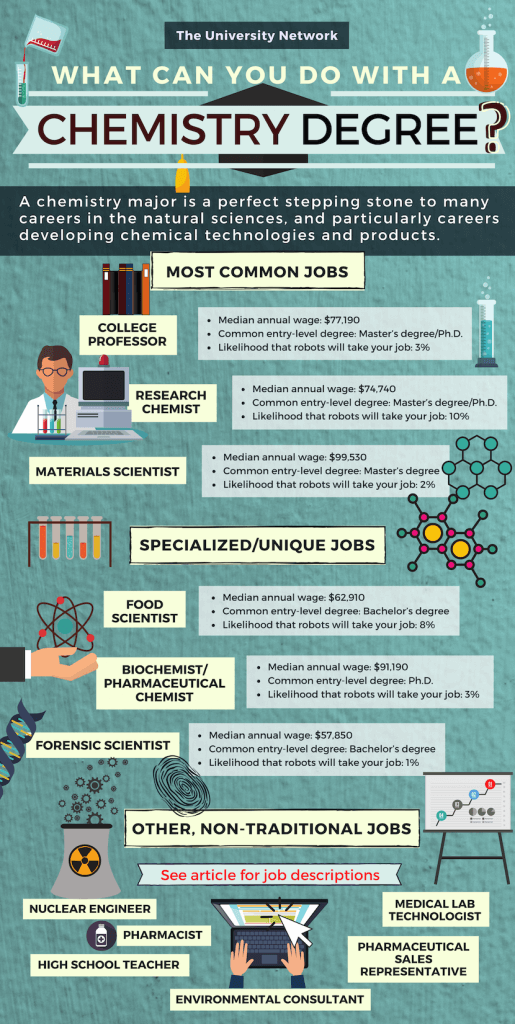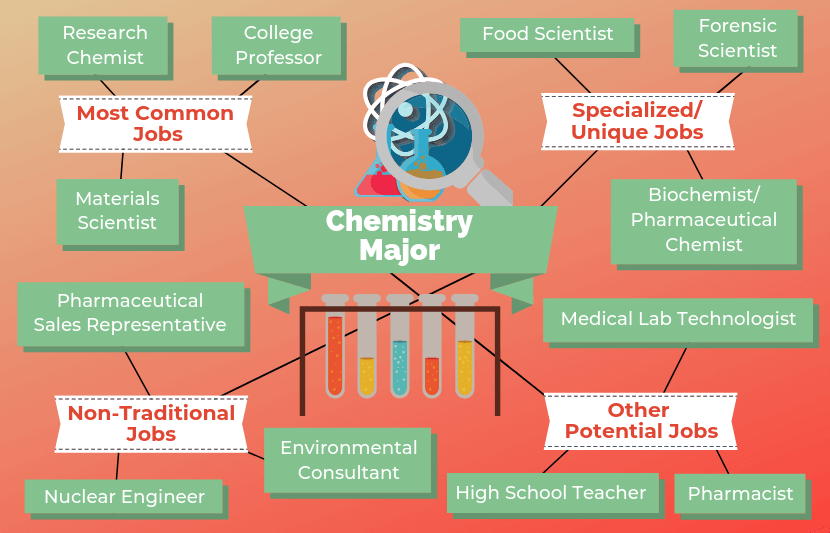A chemistry major is a perfect stepping stone to many careers in the natural sciences, and particularly careers developing chemical technologies and products. Chemists typically work in lab settings, conducting basic research or developing chemical products like drugs, materials, or even foods. Many chemistry-related careers overlap with other natural sciences, so aspiring chemists may want to take coursework in biology, materials science, environmental science, or other subjects, depending on the particular career that they are interested in.
Here is a list of 12 possible jobs for chemistry majors:
Most Common Jobs for Chemistry Majors
1. College Professor
As with many students in the sciences, many chemistry majors go on to become professors of their discipline. Being a college professor is a great option for chemists, as you can nurture and inspire the next generation of chemists while also conducting your own research. To earn a job teaching at the post-secondary level, you will need at least a master’s degree, but you will typically need a doctorate for a full-time tenure-track professorship.
Median annual wage: $77,190
Common entry-level degree: Master’s degree/Ph.D.
Likelihood that robots will take your job: 3%
2. Research Chemist
Research chemists work in both public laboratories and in private organizations across a variety of industries conducting chemical analyses or experiments. This could involve developing chemical technologies or conducting experiments and reporting findings. A bachelor’s degree may get you a job as a lab technician, but most research jobs will require a master’s degree or a doctorate.
Median annual wage: $74,740
Common entry-level degree: Master’s degree/Ph.D.
Likelihood that robots will take your job: 10%
3. Materials Scientist
Materials scientists use knowledge from a variety of scientific fields to study the structures and properties of various natural and synthetic materials. Oftentimes, materials scientists are employed by companies who manufacture products made from metals, ceramics, rubber, polymers, or composites. Many professionals in this field will specialize in a specific type of material or production techniques. Chemists play a crucial role in materials science, providing expertise in the chemical structure and composition of materials. Education requirements for entry into this field vary, and you will often find people of various education levels working side by side. If you have experience, a bachelor’s degree may be enough in some circumstances to find employment. Generally speaking, however, employers look for individuals with at least a master’s degree.
Median annual wage: $99,530
Common entry-level degree: Master’s degree
Likelihood that robots will take your job: 2%

Specialized/Unique Jobs for Chemistry Majors
4. Food Scientist
Food scientists work in agriculture, studying and developing methods to improve the productivity or sustainability of crops and livestock. Food scientists may specialize in a subfield such as soil, plants, or livestock. They may also work as food technologists, developing new food products, packaging techniques, or methods of detecting contaminants. A bachelor’s degree in chemistry with coursework in biology (particularly microbiology) and engineering can be enough to break into the field, though it’s not uncommon to find food scientists with graduate degrees.
Median annual wage: $62,910
Common entry-level degree: Bachelor’s degree
Likelihood that robots will take your job: 8%
5. Biochemist/Pharmaceutical Chemist
Biochemists work in the intersection of chemistry and biology, researching the molecular mechanisms of biological systems. They might work, for example, researching the chemistry of cellular function, the molecular makeup of proteins, or the interaction between chemicals and certain cells. Biochemist may work as basic researchers, conducting experiments in a lab setting without a particular application. They may also work as applied researchers, tackling a particular problem — diseases like cancer or HIV, for example — in their research. They are often employed by pharmaceutical companies to develop new drugs and treatments. While a bachelor’s or master’s degree may be enough to qualify for some entry-level positions as a biological technician or lab assistant, a doctorate is typically required to work in independent research and development positions (as a postdoctoral researcher, for example).
Median annual wage: $91,190
Common entry-level degree: Ph.D.
Likelihood that robots will take your job: 3%
6. Forensic Scientist
Forensic scientists assist criminal investigations by collecting and analyzing physical evidence, such as blood splatters, fingerprints, DNA, tissue, or spent shell casings. This line of work may include on-site evidence collection or working in a laboratory; some forensic scientists are involved in every part of evidence collection and analysis, others might work primarily or entirely in a crime lab. Oftentimes, forensic scientists will be called into trial to testify as expert witnesses on evidence or lab techniques. A bachelor’s degree with coursework in forensic science and related areas of study like toxicology, pathology, or DNA can be enough to find entry-level employment in the field.
Median annual wage: $57,850
Common entry-level degree: Bachelor’s degree
Likelihood that robots will take your job: 1%
Non-Traditional Jobs for Chemistry Majors
7. Nuclear Engineer
Nuclear engineers are experts in the field of nuclear science who use their expertise in a variety of capacities to progress our ability to harness nuclear energy. They may work in the development of technologies that incorporate nuclear energy, which may be used in power plants or even in fields like medicine, where nuclear technologies are sometimes used to diagnose and treat disease. A bachelor’s degree in chemistry is typically not enough to find employment in the field. Aspiring nuclear engineers will need to demonstrate some sort of expertise in nuclear science, so it is best to pursue a master’s degree or even a doctorate in nuclear engineering or another branch of nuclear science.
Median annual wage: $105,810
Common entry-level degree: Master’s degree/Ph.D.
Likelihood that robots will take your job: 7%
8. Pharmaceutical Sales Representative
If you are interested in chemistry, but you are not interested in working in a lab or a research position, you might consider becoming a sales representative for a pharmaceutical company. Sales representatives work on behalf of a pharmaceutical or biotechnology company to sell their products, whether it be medications or medical devices, to doctors, physicians and hospitals. Becoming a sales representative only requires a bachelor’s degree, though many pursue additional education in business as well.
Median annual wage: $78,830
Common entry-level degree: Bachelor’s degree
Likelihood that robots will take your job: 25%
9. Environmental Consultant
Environmental consultants work on projects with organizations offering their expertise on environmental regulations or environmental impact. Typically, they will be employed by an environmental consultancy firm, which take on contracts with commercial or government organizations. Environmental consultants may specialize in subfields like air or water pollution, waste management, natural disaster risk, or renewable energy. In order to become an environmental consultant, you will need at least a bachelor’s degree. A chemistry degree can be helpful in the field, but you will also want to demonstrate a level of proficiency in environmental science, so it is best to take additional coursework in environmental science, ecology, forestry, and related subjects.
Median annual wage: $69,400
Common entry-level degree: Bachelor’s degree
Likelihood that robots will take your job: 3%
Other Potential Jobs for Chemistry Majors
10. High School Teacher
A common path for chemistry majors is to become a high school science teacher. As a teacher, you can communicate and hopefully pass down your love for science to the next generation. To become a secondary school teacher, you will need to graduate with a bachelor’s degree in the subject you want to teach, while completing your school’s teacher preparation program. You’ll then need to complete a teaching internship in your subject, take and pass your state’s teaching licensure tests, and get your teaching license.
Median annual wage: $59,170
Common entry-level degree: Bachelor’s degree
Likelihood that robots will take your job: 1%
11. Medical Lab Technologist
Medical lab technologists generally work analyzing samples of body fluids, tissues and other biological substances. This is a fairly broad term that covers a number of specific roles. A lab technologist may specialize in analyzing body fluids like blood and urine, analyzing the chemical contents of these samples. They may alternatively specialize in microbiology, examining and identifying bacteria, or in cytotechnology, analyzing cells for abnormalities that might signal cancer. A bachelor’s degree in a related field may be enough for entry-level employment, though some employers also might require the completion of a laboratory science program, which typically take no longer than 2 years to complete. Depending on the state you are living in and your specialty, you may also need to obtain licensure or certification.
Median annual wage: $51,770
Common entry-level degree: Bachelor’s degree
Likelihood that robots will take your job: 47%
12. Pharmacist
Pharmacists are responsible for filling and providing patients with prescription drugs, educating patients about the use of medications, and communicating with doctors about medication interactions and issues. In order to become a pharmacist, you will need to hold a Doctor of Pharmacy degree. These programs typically take 4 years and require a minimum requisite of 2 years of undergraduate study (though some may require a bachelor’s degree).
Median annual wage: $124,170
Common entry-level degree: Doctor of Pharmacy (Pharm.D.)
Likelihood that robots will take your job: 1%
10 Famous People Who Studied Chemistry
- Hal Clement, science fiction writer
- Catherine Coleman, astronaut
- David Farr, business executive
- John Fenn, chemist
- Robert H. Grubbs, chemist
- William Lipscomb, chemist
- Gordon Moore, business executive
- Story Musgrave, astronaut
- Indra Nooyi, business executive
- Kurt Vonnegut, fiction writer
To explore options for other majors, click here.



